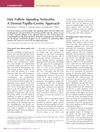 3 citations,
January 2019 in “Jikken doubutsu ihou/Jikken doubutsu/Experimental animals/Jikken Dobutsu”
3 citations,
January 2019 in “Jikken doubutsu ihou/Jikken doubutsu/Experimental animals/Jikken Dobutsu” Pigs without the Hairless gene showed skin and thymus changes, useful for studying human hair disorders.
2 citations,
April 2020 in “International Journal of Dermatology and Venereology” Beta-HPV and MCPyV are linked to certain skin cancers, with ongoing research and vaccine development.
1 citations,
March 2024 in “Nanomaterials” Biomimetic scaffolds are better than traditional methods for growing cells and could help regenerate various tissues.
 1 citations,
December 2022 in “bioRxiv (Cold Spring Harbor Laboratory)”
1 citations,
December 2022 in “bioRxiv (Cold Spring Harbor Laboratory)” Pangolins have lost some skin-related genes, but kept others, showing complex skin evolution.
December 2023 in “Animals” The study mapped yak skin cells to understand hair growth better.
 December 2023 in “Communications biology”
December 2023 in “Communications biology” Targeting the HEDGEHOG-GLI1 pathway could help treat keloids.
 May 2023 in “Frontiers in Immunology”
May 2023 in “Frontiers in Immunology” Treg cell-based therapies might help treat hair loss from alopecia areata, but more research is needed to confirm safety and effectiveness.
 April 2018 in “The journal of investigative dermatology/Journal of investigative dermatology”
April 2018 in “The journal of investigative dermatology/Journal of investigative dermatology” Biotrinine® may be an effective treatment for chronic hair loss.
 28 citations,
March 2016 in “Toxicologic pathology”
28 citations,
March 2016 in “Toxicologic pathology” Dogs could be good models for studying human hair growth and hair loss.
 28 citations,
September 2013 in “Journal of Investigative Dermatology”
28 citations,
September 2013 in “Journal of Investigative Dermatology” The document concludes that dermal papilla cells are key for hair growth and could be used in new hair loss treatments.
 18 citations,
August 2018 in “Facial Plastic Surgery Clinics of North America”
18 citations,
August 2018 in “Facial Plastic Surgery Clinics of North America” Lasers, microneedling, and PRP improve skin rejuvenation and repair, with PRP enhancing the effects when combined with other treatments.
 14 citations,
August 2018 in “Frontiers in Cellular and Infection Microbiology”
14 citations,
August 2018 in “Frontiers in Cellular and Infection Microbiology” Dengue virus can infect human hair follicle cells and may cause hair loss.
 6 citations,
January 2010 in “Springer eBooks”
6 citations,
January 2010 in “Springer eBooks” SA linked to mitochondrial issues and oxidative stress, while AGA involves disrupted hair growth genes.
 2 citations,
September 2023 in “Curēus”
2 citations,
September 2023 in “Curēus” Topical spironolactone may help treat ocular graft-versus-host disease with minimal side effects.
 1 citations,
September 2023 in “Journal of Investigative Dermatology”
1 citations,
September 2023 in “Journal of Investigative Dermatology” Melatonin may protect hair follicle cells from damage caused by a chemotherapy drug.
 1 citations,
September 2013 in “Elsevier eBooks”
1 citations,
September 2013 in “Elsevier eBooks” Hair ages and thins due to factors like inflammation and stress, and treatments like antioxidants and hormones might improve hair health.
 March 2024 in “Cell communication and signaling”
March 2024 in “Cell communication and signaling” Lack of sleep in mice leads to prostatitis by reducing certain hormones and activating an inflammatory pathway, which can be temporarily fixed with normal sleep.
24 citations,
March 2022 in “Genome biology” scINSIGHT accurately identifies cell clusters and gene patterns in complex data.
 5 citations,
November 2022 in “Animal Genetics”
5 citations,
November 2022 in “Animal Genetics” Genomic research can help improve the quality and production of natural fibers in animals.
 April 2018 in “Journal of Investigative Dermatology”
April 2018 in “Journal of Investigative Dermatology” Acne patients' skin, both with and without lesions, shows a strong immune response and higher antimicrobial activity.
 68 citations,
November 2011 in “The American journal of pathology”
68 citations,
November 2011 in “The American journal of pathology” Abnormal Hedgehog signaling in blood cancers may help tumors grow and resist chemotherapy, suggesting potential for targeted treatments.
 1 citations,
August 2023 in “Biomolecules & therapeutics”
1 citations,
August 2023 in “Biomolecules & therapeutics” HAPLN1 can promote hair growth and may help treat hair loss.
 43 citations,
February 2019 in “International immunology”
43 citations,
February 2019 in “International immunology” Special immune cells called Regulatory T cells help control skin inflammation and repair in various skin diseases.
 15 citations,
July 2017 in “PubMed”
15 citations,
July 2017 in “PubMed” Injecting a mix of human skin and hair cells into mice can grow new hair.
 1 citations,
July 2016 in “Elsevier eBooks”
1 citations,
July 2016 in “Elsevier eBooks” Understanding skin structure and development helps diagnose and treat skin disorders.
 January 2019 in “Oncogen”
January 2019 in “Oncogen” Triple Hormonal Blockade (ADT3) can effectively manage prostate cancer but requires careful monitoring for heart risks.
 August 2016 in “Journal of Investigative Dermatology”
August 2016 in “Journal of Investigative Dermatology” Zinc deficiency disrupts hair growth and cycle, but zinc supplements can fix this.
 August 2013 in “Fertility and Sterility”
August 2013 in “Fertility and Sterility” PCOS may be influenced by factors in the blood, not just the ovaries.
 45 citations,
April 2018 in “Nature Reviews Urology”
45 citations,
April 2018 in “Nature Reviews Urology” Male genital development is driven by androgen signaling and understanding it could help address congenital anomalies.
 28 citations,
December 2003 in “Medical Hypotheses”
28 citations,
December 2003 in “Medical Hypotheses” Ketoconazole shampoo with finasteride improves hair density in men with hair loss.


























